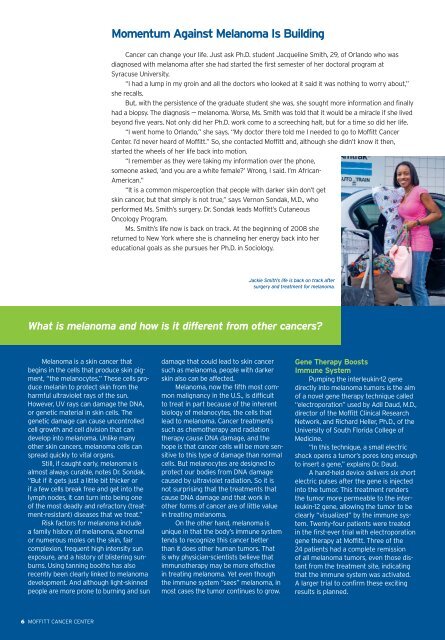Annual Report 2007 3-24-08.pdf - Moffitt Cancer Center
Annual Report 2007 3-24-08.pdf - Moffitt Cancer Center
Annual Report 2007 3-24-08.pdf - Moffitt Cancer Center
Create successful ePaper yourself
Turn your PDF publications into a flip-book with our unique Google optimized e-Paper software.
Momentum Against Melanoma Is Building<br />
<strong>Cancer</strong> can change your life. Just ask Ph.D. student Jacqueline Smith, 29, of Orlando who was<br />
diagnosed with melanoma after she had started the first semester of her doctoral program at<br />
Syracuse University.<br />
“I had a lump in my groin and all the doctors who looked at it said it was nothing to worry about,”<br />
she recalls.<br />
But, with the persistence of the graduate student she was, she sought more information and finally<br />
had a biopsy. The diagnosis –– melanoma. Worse, Ms. Smith was told that it would be a miracle if she lived<br />
beyond five years. Not only did her Ph.D. work come to a screeching halt, but for a time so did her life.<br />
“I went home to Orlando,” she says. “My doctor there told me I needed to go to <strong>Moffitt</strong> <strong>Cancer</strong><br />
<strong>Center</strong>. I’d never heard of <strong>Moffitt</strong>.” So, she contacted <strong>Moffitt</strong> and, although she didn’t know it then,<br />
started the wheels of her life back into motion.<br />
“I remember as they were taking my information over the phone,<br />
someone asked, ‘and you are a white female?’ Wrong, I said. I’m African-<br />
American.”<br />
“It is a common misperception that people with darker skin don’t get<br />
skin cancer, but that simply is not true,” says Vernon Sondak, M.D., who<br />
performed Ms. Smith’s surgery. Dr. Sondak leads <strong>Moffitt</strong>’s Cutaneous<br />
Oncology Program.<br />
Ms. Smith’s life now is back on track. At the beginning of 2008 she<br />
returned to New York where she is channeling her energy back into her<br />
educational goals as she pursues her Ph.D. in Sociology.<br />
Jackie Smith’s life is back on track after<br />
surgery and treatment for melanoma.<br />
What is melanoma and how is it different from other cancers?<br />
Melanoma is a skin cancer that<br />
begins in the cells that produce skin pigment,<br />
“the melanocytes.” These cells produce<br />
melanin to protect skin from the<br />
harmful ultraviolet rays of the sun.<br />
However, UV rays can damage the DNA,<br />
or genetic material in skin cells. The<br />
genetic damage can cause uncontrolled<br />
cell growth and cell division that can<br />
develop into melanoma. Unlike many<br />
other skin cancers, melanoma cells can<br />
spread quickly to vital organs.<br />
Still, if caught early, melanoma is<br />
almost always curable, notes Dr. Sondak.<br />
“But if it gets just a little bit thicker or<br />
if a few cells break free and get into the<br />
lymph nodes, it can turn into being one<br />
of the most deadly and refractory (treatment-resistant)<br />
diseases that we treat.”<br />
Risk factors for melanoma include<br />
a family history of melanoma, abnormal<br />
or numerous moles on the skin, fair<br />
complexion, frequent high intensity sun<br />
exposure, and a history of blistering sunburns.<br />
Using tanning booths has also<br />
recently been clearly linked to melanoma<br />
development. And although light-skinned<br />
people are more prone to burning and sun<br />
damage that could lead to skin cancer<br />
such as melanoma, people with darker<br />
skin also can be affected.<br />
Melanoma, now the fifth most common<br />
malignancy in the U.S., is difficult<br />
to treat in part because of the inherent<br />
biology of melanocytes, the cells that<br />
lead to melanoma. <strong>Cancer</strong> treatments<br />
such as chemotherapy and radiation<br />
therapy cause DNA damage, and the<br />
hope is that cancer cells will be more sensitive<br />
to this type of damage than normal<br />
cells. But melanocytes are designed to<br />
protect our bodies from DNA damage<br />
caused by ultraviolet radiation. So it is<br />
not surprising that the treatments that<br />
cause DNA damage and that work in<br />
other forms of cancer are of little value<br />
in treating melanoma.<br />
On the other hand, melanoma is<br />
unique in that the body’s immune system<br />
tends to recognize this cancer better<br />
than it does other human tumors. That<br />
is why physician-scientists believe that<br />
immunotherapy may be more effective<br />
in treating melanoma. Yet even though<br />
the immune system “sees” melanoma, in<br />
most cases the tumor continues to grow.<br />
Gene Therapy Boosts<br />
Immune System<br />
Pumping the interleukin-12 gene<br />
directly into melanoma tumors is the aim<br />
of a novel gene therapy technique called<br />
“electroporation” used by Adil Daud, M.D.,<br />
director of the <strong>Moffitt</strong> Clinical Research<br />
Network, and Richard Heller, Ph.D., of the<br />
University of South Florida College of<br />
Medicine.<br />
“In this technique, a small electric<br />
shock opens a tumor’s pores long enough<br />
to insert a gene,” explains Dr. Daud.<br />
A hand-held device delivers six short<br />
electric pulses after the gene is injected<br />
into the tumor. This treatment renders<br />
the tumor more permeable to the interleukin-12<br />
gene, allowing the tumor to be<br />
clearly “visualized” by the immune system.<br />
Twenty-four patients were treated<br />
in the first-ever trial with electroporation<br />
gene therapy at <strong>Moffitt</strong>. Three of the<br />
<strong>24</strong> patients had a complete remission<br />
of all melanoma tumors, even those distant<br />
from the treatment site, indicating<br />
that the immune system was activated.<br />
A larger trial to confirm these exciting<br />
results is planned.<br />
6 MOFFITT CANCER CENTER








